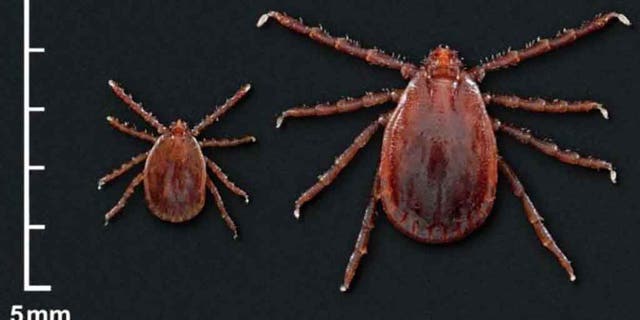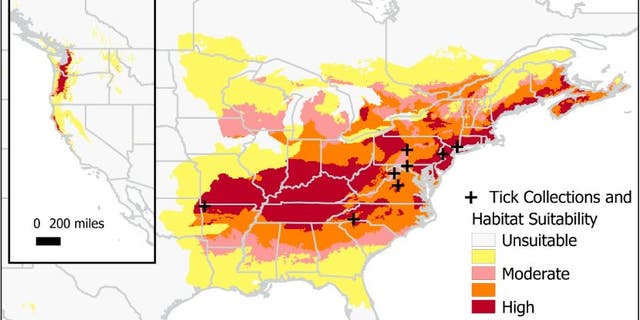Two exotic species of ticks have been discovered for the first time in Rhode Island, state officials announced Monday.
The Rhode Island Department of Environmental Management said both Asian and Eurasian ticks were discovered on Block Island as part of a decade-long study of ticks on the island.
“It was confirmed by DNA and morphological characteristics that they are ticks not previously found in Rhode Island,” the agency said.
HOW TO AVOID TICK-BORNE ILLNESSES
The ticks were discovered by Danielle M. Tufts, a former associate research scientist at Columbia University.
Tufts identified the tick species Haemaphysalis longicornis, also known as the Asian longhorn tick, and Haemaphysalis punctata when studying ticks on Block Island this summer.
The ticks were originally thought to be native, but on further examination were found to be exotic species.
The Asian longhorn tick was first detected in the U.S. in 2017 in New Jersey, but archived samples later determined these ticks may have been in the country since at least 2010.

Asian longhorned ticks were first discovered in the U.S. in August 2017.
(CDC)
“The Asian longhorned tick is considered a serious threat to livestock in Australia and New Zealand, where it is invasive,” the agency said Monday. “It poses a risk to New England livestock because it can attach itself to various warm-blooded animals to feed. If too many ticks attach to one animal, the loss of blood can kill the animal.”
INVASIVE TICK IS ‘HERE TO STAY,’ AND HERE’S WHERE IT COULD SPREAD NEXT
In 2018, a study warned the tick could spread to much of the eastern U.S. and parts of the Midwest, as well as a small section of the Pacific Northwest.

A map showing the potential range of the Asian longhorned tick (Haemaphysalis longicornis) in North America, according to a 2018 study published in the Journal of Medical Entomology.
(Ilia Rochlin, Ph.D., Rutgers University Center for Vector Biology)
The H. punctata, known as the “red sheep tick,” is native to the southern half of Europe, as well as England and parts of the North African coast.
“The finding on Block Island is notable because this tick is not known to exist outside of its home range,” state officials said.
Both types of ticks can transmit a “variety of diseases” to humans and animals, however, only one disease has been found in these ticks in the U.S.
CLICK HERE FOR THE FOX NEWS APP
Officials recommend the following guidelines to prevent ticks:
- Apply tick repellents to exposed skin and clothing.
- Spray permethrin-containing products on outer clothing, including shoes. Permethrin should not be used directly on skin.
- Check clothing and exposed skin prior to moving from one area to another.
- Wear light colored long-sleeved shirts and long pants.
- Conduct body checks immediately after returning from outdoor activities in tick-infested areas.
“If ticks are found, remove them by using fine-tipped tweezers, wash the affected area with soap and water, and disinfect the bite site,” the agency said. “To protect hunting dogs, hunters should check with their veterinarian about an appropriate topical or systemic tick-control treatment for their dog.”
source https://betterweightloss.info/two-exotic-tick-species-found-in-rhode-island-for-the-first-time-officials-say/

No comments:
Post a Comment